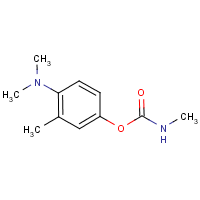Aminocarb
Agent Name
Aminocarb
CAS Number
2032-59-9
Formula
C11-H16-N2-O2
Major Category
Pesticides

Synonyms
(4-Dimethylamino-3-methyl-phenyl)N-methyl-carbamaat [Dutch]; (4-Dimethylamino-3-methyl-phenyl)N-methyl-carbamat [German]; (4-Dimethylamino-3-methyl-phenyl)N-methyl-carbamate; (4-Dimetilamino-3-metil-fenil)-N-metil-carbammato [Italian]; 3-Methyl-4-dimethylaminophenyl methylcarbamate; 4-(Dimethylamino)-3-methylphenol methyl carbamate (ester); 4-(Dimethylamino)-3-methylphenol methylcarbamate (ester); 4-(Dimethylamino)-3-methylphenyl methylcarbamate; 4-(Dimethylamino)-m-tolyl methylcarbamate; 4-Dimethylamine m-cresyl methylcarbamate; 4-Dimethylamine-m-cresyl methylcarbamate; 4-Dimethylamino-3-cresyl methylcarbamate; A 363; Aminocarbe [ISO-French]; BAY 44646; Bayer 44646; Bayer 5080; Carbamic acid, methyl-, 4-(dimethylamino)-3-methylphenyl ester; Carbamic acid, methyl-, 4-(dimethylamino)-m-tolyl ester; Matacil; Matacil 180D; Methylcarbamic acid 4-(dimethylamino)-m-tolyl ester; Mitacil; N-N-Methylcarbamate de 4-dimethylamino 3-methyl phenyle [French]; Phenol, 4-(dimethylamino)-3-methyl-, methylcarbamate (ester); m-Cresol, 4-(dimethylamino)-, methylcarbamate (ester); [ChemIDplus] UN2757
Category
Carbamate Insecticides
Description
White solid; [ICSC] Colorless solid; [MSDSonline]
Sources/Uses
Used as insecticide for control of forest pests and chewing insects in cotton and field crops; Discontinued in 1989 by Bayer AG; [HSDB]
Comments
A cholinesterase inhibitor that may have nervous system effects causing convulsions and respiratory failure; Can be absorbed through skin; May also cause long term effects to nervous system and liver; [ICSC] No significant adverse effects in rats fed 200 mg/kg diet for 2 years; [HSDB] No inhibition of brain cholinesterase activity or histopathological tissue changes observed in feeding studies with rats; In a three generation study with rats a decrease in litter size and mean pup weight was observed, but no adverse morphological tissue changes; Changes to liver observed in long term studies with rats and dogs; No evidence of delayed neurotoxicity in hens; Mortality from lethal doses usually occurred within half hour; Sub-lethal dosing recovery often within three hours; [Reference #1] See "CARBAMATE INSECTICIDES."
Restricted
Cancelled--no longer registered as a pesticide for use in the US; [HSDB]
Reference Link #1
Biomedical References
Exposure Assessment
BEI
Acetylcholinesterase activity in red blood cells = 70% of individual's baseline; Butylcholinesterase activity in serum or plasma = 60% of individual's baseline; Sample at end of shift; [TLVs and BEIs]
Vapor Pressure
1.88E-06 mm Hg
Lethal Concentration
LD50 (rat) = 200 mg/m3/4h
Explanatory Notes
The Guide in the Emergency Response Guidebook is for "Carbamate pesticide, solid, toxic."
Adverse Effects
Hepatotoxin
Hepatoxic (a) from occupational exposure (secondary effect) or (b) in animal studies or in humans after ingestion
Other Poison
Carbamate
Diseases, Processes, and Activities Linked to This Agent
Diseases
Occupational diseases associated with exposure to this agent:
Processes
Industrial Processes with risk of exposure: